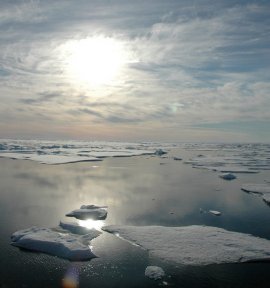Did global warming stop
 |
| The dramatic loss of Arctic sea ice this summer is just one of the signs global warming has not stopped, scientists say.
Credit: Jeremy Potter NOAA/OAR/OER |
Claims global warming stopped 15 years ago are based on "cherry-picked" data and don't account for natural fluctuations in climate, according to climate scientists responding to an article that appeared Saturday (Oct. 13) in the British newspaper, The Daily Mail.
The article cites combined global land and sea-temperature data compiled by British climate researchers, claiming that between August 1997 and August 2012, "there was no discernable rise in aggregate global temperatures."
The article appears to be based on an update to a global temperature dataset called HadCRUT4, which is compiled by the U.K.'s national weather service, known as The Met Office, and the University of East Anglia's Climate Research Unit.
Michael Mann, a climate scientist at Pennsylvania State University, called the latest story "just more dishonest cherry-picking and sleight of hand by Rose" and his go-to sources.
"This is just one in a continuing series of hit pieces by David Rose in The Daily Mail that completely misrepresents climate science and climate scientists. Global warming hasn't stopped by any objective measure; it is proceeding right on schedule. In many respects (e.g. the dramatic loss of Arctic sea ice this summer), it is well ahead of schedule, " Mann told LiveScience in an email. [8 Ways Global Warming Is Already Changing the World]
In the Met's response to the article, they state the answers they provided to Rose's questions before he wrote the article.In them, The Met states that the data show an increase in global temperatures of 0.09 degrees Fahrenheit (0.05 degrees Celsius) between August 1997 and August 2012, adding that calculating the trend beginning in 1999 would show a more substantial warming.
In other words, the trend you see will vary depending on the start and end dates chosen.
"Climate change can only be detected from multi-decadal timescales due to the inherent variability in the climate system, " reads The Met's response.
At the core of the debate are natural fluctuations in climate and the role they play in climate change. Natural patterns — such as cycles in ocean surface temperatures — can play out over multiple decades, augmenting or counteracting the effects of man-made changes.
As a result, only over longer time periods do the effects of human-caused climate change become clear.
"Over the last 140 years global [sea] surface temperatures have risen by about 0.8 degrees C [1.44 degrees Fahrenheit], " responds The Met. "However, within this record there have been several periods lasting a decade or more during which temperatures have risen very slowly or cooled. The current period of reduced warming is not unprecedented and 15 year long periods are not unusual."
An earlier article Rose wrote for The Daily Mail invoked the global temperature plateau to question man-made global warming and pointed to cycles in the sun's activity as having an important influence in climate. Recent research suggests that while the sun's lulls and flare-ups may impact Earth's temperature, man-made greenhouse gases are the main drivers of global warming.



|
Help To Stop Global Warming - Cotton Canvas Tote Bag Kitchen (Rock Bull)
|

|
iPad Air Case + Transparent Back Cover - Help To Stop Global Warming - [Auto Wake/Sleep Function] [Ultra Slim] [Light Weight] CE (Rock Bull)
|

|
Help To Stop Global Warming - Picture Metal Frame for Table Top (Black & White 7x5 inches) Home (Rock Bull)
|